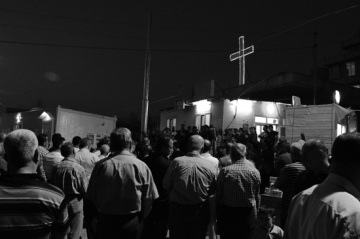Monastery of Saint Benedict
January 19, 2020
On this second day of the week of prayer for Christian Unity, I want to call your attention to a remarkable coming together of Catholics and Mennonites in a movement called Bridgefolk. The Mennonites, who are often referred to as one of the historic peace churches because of their commitment to non-violence, are not very numerous, especially in this part of the country, but they have a special connection with Saint Ben’s and Saint John’s.
Twenty years ago, a Mennonite pastor from Seattle who was drawn to Catholic spirituality and sacramental practice spent a sabbatical year at the Collegeville Institute. He and some Mennonite friends who shared his interest in Catholicism went to see our newly elected Abbot John to seek his counsel about what the next steps might be, and out of that conversation was born Bridgefolk, a gathering of Catholics and Mennonites who this year will hold their nineteenth consecutive annual meeting here at Saint Ben’s, the third time Bridgefolk will meet on this campus. Sister Anne Marie Biermaier OSB and Sister Karen Rose OSB, who is on the Bridgefolk Board of Directors, are handling much of the preparation for this year’s conference, which will examine how our two traditions understand and put into practice Christ’s commandment to love our neighbor, especially when our new neighbors are culturally, ethnically, and religiously different from us. I should also mention that in its early years, Sister Merle Nolde OSB was very involved in Bridgefolk. More recently, before her untimely death last year, Sister Theresa Schumacher OSB served on the board of directors and contributed greatly to the ecumenical mission of Bridgefolk.
Bridgefolk can be described as a movement of sacramentally-minded Mennonites and peace-minded Catholics who want to celebrate each other’s traditions, explore each other’s practices, and honor each other’s contribution to the mission of Christ’s Church. The Mennonites offer Catholics their tradition of discipleship, peacemaking, and lay participation. The Catholics offer Mennonites their spiritual, liturgical, and sacramental practices. The goal of Christian unity espoused by Bridgefolk is not conformity but communion, a communion of churches that respect one another’s spiritual gifts and share them.
Some might criticize the Mennonites, saying they are so committed to non-violence that they enable those who act violently, but such a critique would reveal how little they know about this church. The Mennonites resist violence, but they do so non-violently by devoting themselves to peacemaking efforts, relief missions, and the promotion of social justice. Almost every Mennonite I know seems to have spent some time in communities around the world that are ravaged by natural disasters, civil conflicts, racism, or war. They work quietly and generously to offer compassion, uphold justice, and bring relief.
Today we hear John the Baptist call Jesus the Lamb of God. That way of referring to Jesus has become so familiar to us that we may not realize just how shocking this metaphor is. To us a lamb is little more than cuddly baby sheep. To John’s contemporaries, however, the lamb was an animal of sacrifice. When the crowds at the Jordan heard John refer to Jesus as the Lamb of God who takes away the sin of the world, they must have thought of the paschal lamb of the Exodus, whose blood was sprinkled on the doorposts of the Israelites in Egypt so that the angel of death would pass over them. They might also have remembered that Isaiah spoke of a servant of God who was like a lamb that did not open its mouth as it was led to the slaughter.
That image of a lamb taking upon itself our sins and not opening its mouth as it is about to be killed is an apt symbol of the Mennonite way of discipleship. Their commitment to non-violence flows from their desire to become like Jesus, the Lamb of God, who did not resist those who came to arrest him and did not open his mouth when accused, much to Pilate’s surprise (Matt 27:14).
The Mennonites describe their refusal to defend themselves by means of violent words or actions with the German word Gelassenheit, one of those words that is almost impossible to translate. Gelassenheit means something like self-surrender, submission, yielding to the will of God and to others, contentment, and a calm spirit. “Letting go” might be good way of translating it—letting go of anger and hatred, letting go of insisting that we get our way, letting go of harsh and demeaning words, letting go of judging those who do not agree with us. Gelassenheit is the opposite of promoting self-interest at every turn and lashing out at anyone or anything that gets in our way.
The Mennonites’ commitment to non-violence and peace making as an essential component of the Christian message is an extraordinary gift that they offer to the whole Church of Christ, a gift that we can and should accept with overflowing gratitude
There are and have been other great witnesses to non-violence as an essential feature of Christian discipleship. This week, of course, we honor one of the greatest of them, Dr. Martin Luther King Jr., who showed us that to be the Church of Christ the Lamb of God means putting innocence in the place of malice, love in the place of violence, humility in the place of pride, and service in the place of prestige.
With their example to inspire us, may we continue to strive to be that kind of honest, humble, peace and justice-seeking church, we who at every Mass pray that the Lamb of God will have mercy on us, and that, unworthy as we are to receive him in the sacrament of his body and blood, he will come to us and heal us.
Abbot John Klassen OSB
Saint John’s Abbey
Collegeville, MN 56321



